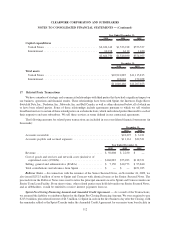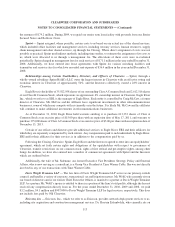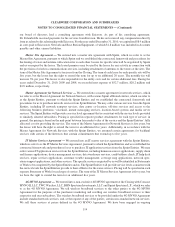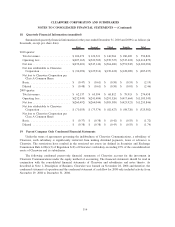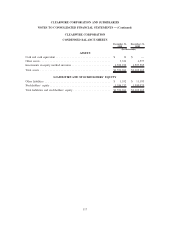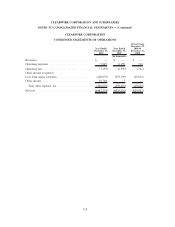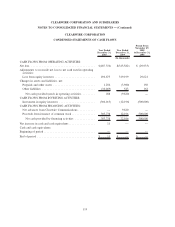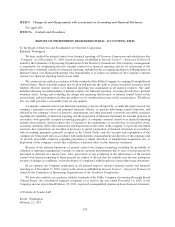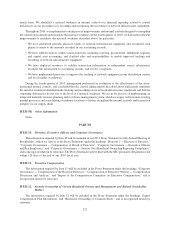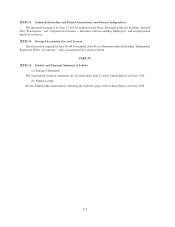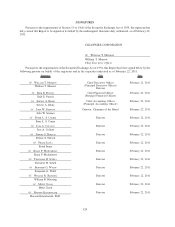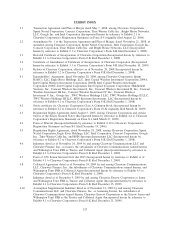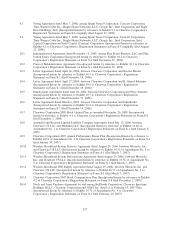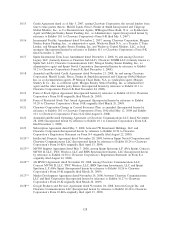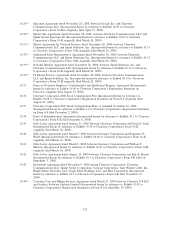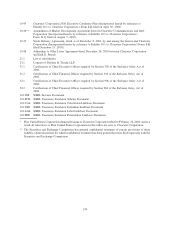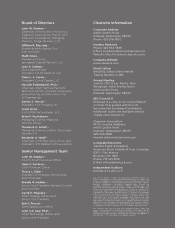Clearwire 2010 Annual Report Download - page 126
Download and view the complete annual report
Please find page 126 of the 2010 Clearwire annual report below. You can navigate through the pages in the report by either clicking on the pages listed below, or by using the keyword search tool below to find specific information within the annual report.Evaluation of Disclosure Controls and Procedures
We maintain disclosure controls and procedures that are designed to ensure that material information required
to be disclosed in our periodic reports filed under the Securities Exchange Act of 1934, as amended (the Exchange
Act), is recorded, processed, summarized and reported within the time periods specified in the SEC’s rules and
forms. Our disclosure controls and procedures are also designed to ensure that such information is accumulated and
communicated to our management, including our Chief Executive Officer (CEO) and Chief Financial Officer
(CFO), as appropriate, to allow timely decisions regarding required disclosure.
During the fourth quarter of fiscal 2010, our management, under the supervision and with the participation of
our CEO and our CFO, carried out an evaluation of the effectiveness of the design and operation of our disclosure
controls and procedures, as defined in Rules 13a-15(e) and 15d-15(e) under the Exchange Act. Based upon that
evaluation, our CEO and CFO concluded that our disclosure controls and procedures were effective as of
December 31, 2010.
Except as described below under “Changes in Internal Control Over Financial Reporting”, there were no
changes in our internal control over financial reporting (as defined in Rules 13a-15(f) and 15d-15(f) of the Exchange
Act) that have materially affected or are reasonably likely to materially affect internal control over financial
reporting.
The certifications required by Section 302 of the Sarbanes-Oxley Act of 2002 are filed as Exhibits 31.1 and
31.2, respectively, to this Annual Report on Form 10-K.
Report of Management on Internal Control over Financial Reporting
Our management is responsible for establishing and maintaining adequate internal control over financial
reporting. Internal control over financial reporting is a process designed by, or under the supervision of, our CEO
and CFO and effected by our board of directors, management or other personnel, to provide reasonable assurance
regarding the reliability of our financial reporting and the preparation of financial statements for external purposes
in accordance with accounting principles generally accepted in the United States of America (GAAP). Internal
control over financial reporting includes maintaining records that in reasonable detail accurately and fairly reflect
our transactions; providing reasonable assurance that transactions are recorded as necessary for preparation of our
financial statements in accordance with GAAP; providing reasonable assurance that our receipts and expenditures
are made in accordance with management authorization; and providing reasonable assurance that unauthorized
acquisition, use or disposition of company assets that could have a material effect our financial statements would be
prevented or detected on a timely basis. Because of its inherent limitations, internal control over financial reporting
is not intended to provide absolute assurance that a misstatement of our financial statements would be prevented or
detected.
Management, under the supervision and with the participation of our CEO and CFO, conducted an evaluation
of the effectiveness of our internal control over financial reporting based on the framework and criteria established
in Internal Control — Integrated Framework, issued by the Committee of Sponsoring Organizations of the
Treadway Commission. This evaluation included review of the documentation of controls, evaluation of the
design effectiveness of controls, testing of the operating effectiveness of controls and a conclusion on this
evaluation. Based on this evaluation, our CEO and CFO concluded that our internal control over financial reporting
was effective as of December 31, 2010.
Our internal control over financial reporting as of December 31, 2010, has been audited by Deloitte & Touche
LLP, an independent registered public accounting firm, as stated in their report which is included herein.
Changes in Internal Control over Financial Reporting
During the quarter ended December 31, 2009 and continuing through the quarter ended September 30, 2010,
we reported a material weakness in internal control over financial reporting. A material weakness is a deficiency, or
combination of deficiencies, in internal control over financial reporting, such that there is a reasonable possibility
that a material misstatement of our annual or interim financial statements will not be prevented or detected on a
121



